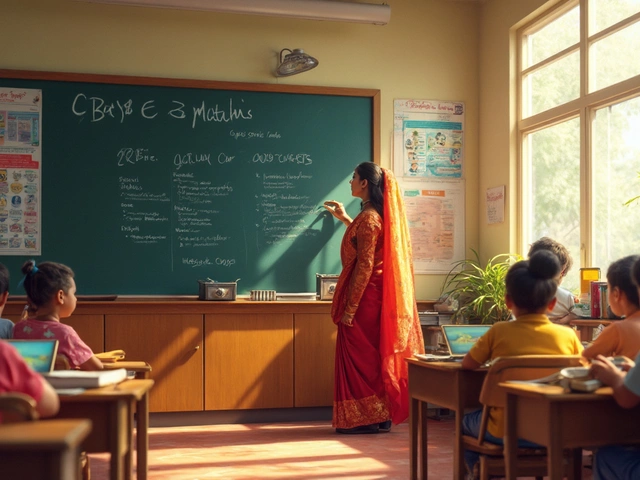Feb
12

- by Dhruv Ainsley
- 0 Comments
Ever wondered why some licenses are tougher to get than a camel through the eye of a needle? It's not just about the hoops you jump through, but the leaps, bounds, and sprints across those hoops. Some licenses aren't just pieces of paper — they're proof that you've wrangled with some serious brain teasers and come out on top.
Take the Bar Exam, for instance. It's legendary for turning even the sharpest minds into a bundle of nerves. Aspiring lawyers face hours of scratching their heads over complex legal codes. It's like a rite of passage through a maze of case laws and tricky statutes. Prepare to drown in textbooks and live on caffeine for weeks on end.
Pilots, meanwhile, might make flying look easy-peasy but getting their wings? It's an entirely different ball game. They need to clock serious flight hours, absorb aviation theory that would make most heads spin, and pass both written and practical tests. Imagine balancing a book on your head while riding a bike, blindfolded – that’s half the challenge!
- Understanding License Difficulty
- The Infamous Bar Exam
- Piloting: More Than Just Flying
- Certified Public Accountancy: A Numbers Game
- Mastering Medical Licensing
- Global Parallels and Insights
Understanding License Difficulty
So, you're curious about what makes a license so hard to grab? It's not just about the length of the exam or the number of study hours. The difficulty of a license hinges on a mix of factors that make each one a unique tough cookie.
High Stakes, High Pressure
First up, think about the stakes involved. A toughest license usually holds a lot of weight in terms of responsibility and impact. For instance, when a pilot makes a mistake, it's not just a simple ‘oops’ moment. The pressure to perform perfectly is dialed up sky-high.
Complexity of Subject Matter
The complexity of the field itself can ramp up difficulty. Legal exams, like the infamous Bar Exam, dive deep into layers and layers of laws. It’s like trying to memorize the phone book and the encyclopedia at the same time. The same goes for Certified Public Accountants, who swim in numbers and regulations.
Stringent Requirements
Then, there’s the prerequisites. Often, competition exams for licenses require years of education or experience just to be eligible. Medical exams, for example, need an extensive academic background before you even sit for the test.
Global Standards and Benchmarks
Some licenses are difficult because they aim to meet global standards. Passing these means proving you can hold your own anywhere in the world. This global benchmark scenario applies to many engineering and technical licenses.
Statistical Pass Rates
Finally, the pass rates paint a telling picture. For instance, the Bar Exam pass rates hover around 65-70%, while only about 40% of CPA candidates pass on their first try. This shows just how stringent and demanding these tests are.
| License Type | Average First-time Pass Rate |
|---|---|
| Bar Exam | 65-70% |
| CPA Exam | 40% |
Understanding these aspects can prepare you better for the climb. Knowing what's involved helps you not just play the game, but play to win.
The Infamous Bar Exam
The Bar Exam isn't just notorious for being tough; it's practically a legend in itself. Anyone dreaming of entering the legal world knows this exam is the gatekeeper. It's designed to assess whether a law school grad is fit to practice law in a specific jurisdiction. And guess what? Not all Bar Exams are created equal—they vary widely from state to state.
What's in the Exam?
Usually, the exam spans two days. The first day often tackles the Multistate Bar Exam (MBE), a six-hour marathon covering contracts, torts, constitutional law, and more. If you're thinking it's just a bunch of multiple-choice questions, think again. These aren't your everyday, run-of-the-mill questions—they demand precision and an analytical mind.
The second day is where it gets even more interesting. That's when you face essays testing your ability to apply the law to different scenarios. Some states add the Multistate Performance Test (MPT), focusing on lawyering skills using real-world situations.
Why's It So Tough?
The unforgiving pass rate is one reason why the Bar Exam earns its tough reputation. California, for example, is notoriously challenging, with pass rates often falling below 50%. It's not just about having legal knowledge but knowing how to apply it under pressure—because you will be under pressure.
- Intensive Knowledge: The exam demands a broad and deep understanding of various legal areas, making the preparation phase exhaustive.
- Time Management: You need to master pacing yourself to get through long questions without panic setting in.
- Stress: The pressure to pass is immense, often due to the limited opportunities to retake it within a year.
Tips for Tackling the Bar Exam
Dig deep into practice questions. Familiarity with the exam format can turn anxiety into confidence. Another tip is to create a study schedule you strictly follow. Mixing study sessions with breaks can keep your brain fresh.
Pondering whether to take a prep course? It can be a lifesaver. These courses are structured to cover all necessary topics and provide endless practice questions—crucial for acing the Bar.
Interesting Tidbit
In some jurisdictions, experienced attorneys from other states can waive the Bar Exam if they've practiced for a certain number of years. Although, don't bet on it; most fresh grads must take the traditional route.
| State | Average Pass Rate |
|---|---|
| California | 40-50% |
| New York | 55-60% |
| Texas | 70-75% |
While the Bar Exam is undeniably daunting, success—like every daunting journey—comes to those who prepare and persevere. It might feel like slaying a dragon, but one day, you'll look back and be proud you tackled one of the hardest licenses out there.
Piloting: More Than Just Flying
When it comes to acquiring an aviation license, it’s a journey that’s truly so much more than learning to steer a metal bird across the skies. To earn this badge of honor, aspiring pilots undergo extensive training that would make anyone’s head spin faster than a propeller.
Flight Hours and Training
Logging flight hours is no casual weekend activity. Pilots need to clock hundreds of hours—usually a minimum of 1,500 for a commercial license in the U.S. And it’s not just joyrides; these hours include everything from solo flights to night navigation to instrument training under the hood, meaning flying without visual references.
The training is a gauntlet of tasks to conquer, like perfecting takeoffs, navigating busy airspace, and managing in-flight emergencies with aplomb. Every maneuver is scrutinized and corrected, demanding precision and a cool-as-a-cucumber demeanor.
Ground School and Exams
A pilot’s intellect is tested as rigorously as their flying. Ground school involves absorbing core aviation knowledge—think meteorology, aerodynamics, and the dizzying air traffic control protocols. Candidates must pass several written exams that are far from a walk in the park. Imagine studying a foreign language but twice as complex.
The exams ensure that budding pilots can safely react to any situation, balancing knowledge with quick, decisive action. It’s all about sharpening that mental acumen to make split-second lifesaving decisions.
Final Checkride
The final hurdle is the infamous checkride, an in-flight test with an FAA examiner. This isn’t a laid-back passenger ride; it’s a comprehensive review of both skills and knowledge, scrutinizing every action from pre-flight to touchdown. One wrong move, and it's back to the drawing board.
Legend has it that some pilots claim their checkride nerves rival their wedding day jitters. Though the pressure is intense, passing it means a spot among the elite – the sky’s certified gatekeepers.
The hardest license to obtain in aviation demands more than just the ability to fly. It’s a rigorous process filled with constant learning and evaluation, ensuring that only those who truly master the art of aviation can take the helm. So, if you’re considering this path, gear up—it’s a high-flying adventure like no other.

Certified Public Accountancy: A Numbers Game
Do you dream of being a number-crunching powerhouse? Well, securing the Certified Public Accountancy (CPA) license is like unlocking a vault of opportunities. But, let’s not sugarcoat it – the path is no walk in the park. We’re talking about one of the toughest exams related to numbers.
The CPA exam is broken down into four parts: Auditing and Attestation (AUD), Business Environment and Concepts (BEC), Financial Accounting and Reporting (FAR), and Regulation (REG). Most candidates consider FAR the beast of the bunch due to its intensity and wide scope. Each section has its quirks and requires minds that can multitask between rules, concepts, and real-world applications.
Why Is It So Tough?
Imagine having a three-ring circus of numbers, formulas, and regulations–that’s what a CPA candidate juggles. The exam tests not just your number skills but your resilience and adaptability to new financial landscapes. You need to score a minimum of 75 on each part, which is no small feat when percentages of passing hover around the 50% mark.
To put it in perspective, here's a quick rundown of passing rates for 2024:
| Section | Pass Rate |
|---|---|
| AUD | 48.6% |
| BEC | 59.9% |
| FAR | 45.2% |
| REG | 55.4% |
Preparation Tips
So, how do you conquer this mountain of accounting madness? Here are a few nuggets of wisdom:
- Plan Smart: Break down your study schedule and stick to it like glue. Include time for review and, yes, relaxation.
- Practice: Use mock tests to your advantage. They not only familiarize you with the format but also help manage time pressure.
- Use Reliable Resources: Invest in reputable CPA study materials. Having the right materials can make all the difference.
- Join Study Groups: Share insights and strategies with peers – it’s a good way to reinforce learning while decreasing stress.
Bottom line, this is an intense journey. But securing that CPA license? Totally worth it if you're ready to navigate through one of the hardest license exams out there.
Mastering Medical Licensing
Getting that medical license isn't just about having a fancy degree hanging on your wall — it's about proving you have what it takes to handle the demanding world of healthcare. Medical licensing exams are designed to ensure doctors not only have strong theoretical knowledge but can also apply this in practical, real-world situations. It's like prepping for the big leagues in helping people stay alive and kicking!
USMLE and Beyond
The United States Medical Licensing Examination (USMLE) is one of the grueling steps every aspiring doctor faces. Divided into three parts, it tests everything from basic sciences to clinical knowledge and skills. It's no stroll in the park. As one test-taker notes in an
“It's a true test of endurance and focus. You need to see it as a marathon, not a sprint.”Think long, intense study hours coupled with simulators and practice questions that prepare you for both the written and practical parts.
Steps to Conquer the Beast
Here’s a straightforward to-do to help tackle the exam:
- Early Prep: Start with basic sciences early on. Materials like First Aid and UWorld are popular resources.
- Practice: Schedule regular practice exams. It builds confidence and helps spot weak areas.
- Join Study Groups: Sometimes other people's insights can fill the gaps in your knowledge.
- Stay Healthy: Don't ignore your own well-being! Balanced meals, exercise, and rest are essentials.
What About Other Countries?
While the USMLE is talked about a lot, other countries have their own systems too. Take India, for instance, where the NEET PG exam decides who moves on to specialized training. Similarly, the PLAB tests in the UK are critical for international doctors. Each of these exams shares a commitment to ensuring only the truly qualified can practice medicine.
The world may have various systems, but the mission remains consistent: ensuring that doctors are ready to offer the highest standard of care. It's tough, but at the end of the day, a medical license is a validation of all the hard work that goes into becoming a lifesaver.
Global Parallels and Insights
Ever wonder how getting a license stacks up across the globe? Turns out, no matter where you are, some credentials mean pulling out all the stops. But comparing these licenses reveals some fascinating insights into what different countries value most.
Legal Licensing Around the World
The Bar Exam is a beast everywhere, but the challenge level often depends on the country's legal complexity. In the United States, extensive knowledge of both federal and state laws is required, making the exam notoriously difficult. On the other hand, the UK's Bar Professional Training Course is intense in its own way, demanding hands-on practice and theoretical understanding.
Meanwhile, in Japan, future lawyers must tackle the National Bar Examination, which historically had a passing rate lower than 20%. Talk about weeding out the competition!
Navigating Skyward: Pilots Across Borders
Piloting is another realm where difficulty knows no borders. The Joint Aviation Authorities in Europe demand around 1,500 flight hours compared to the Federal Aviation Administration in the U.S., which requires a minimum of 1,500 hours for an Airline Transport Pilot License. This discrepancy shapes how pilots are trained and influences their focus—whether on safety, customer service, or skill enhancement.
Interestingly, in Canada, pilots benefit from a structured flight training program with a prerequisite of only 200 flight hours for a Commercial Pilot License, making it a bit more accessible for newcomers looking to break into aviation.
The Accountancy Factor
If you think accountancy is just about crunching numbers, think again. The Certified Public Accountancy exam, known as CPA in the U.S., requires extensive study and hands-on experience. Compare this to the Chartered Accountant qualifications in the UK or India, which involve a series of grueling exams and extensive internships.
Interestingly, more than 50% of CPA candidates in the U.S. have claimed to need over a year of study before passing all four exam sections. Meanwhile, in Australia, similar certifications focus heavily on accounting standards and public practice experience.
Medical Licensing: A Global Snapshot
The medical field demands excellence worldwide. From the United States Medical Licensing Examination (USMLE) to the UK's PLAB (Professional and Linguistic Assessments Board) test, each presents unique challenges. Interestingly, in Germany, medical graduates undergo rigorous evaluations and practical examinations that test their adaptability and knowledge over several years.
Did you know that in Australia only about 34% of international medical graduates pass on their first try? This goes to show that even top-notch practitioners need to be at the top of their game to work overseas.





